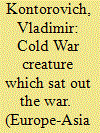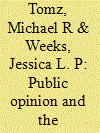| Srl | Item |
| 1 |
ID:
131790


|
|
|
|
|
| Publication |
2014.
|
| Summary/Abstract |
A substantial body of literature argues that government funding motivated by the Cold War shaped (or distorted) the content of the American academic disciplines. This article tests the impact of such funding on the academic study of the Soviet economy, a small field created to help fight the Cold War. It documents the amount of attention given by researchers to the military sector of the Soviet economy, the topic of central importance for the Cold War, and finds that their publications largely ignored it. Considerations other than the interests of the sponsors determined the choice of topics in the discipline.
|
|
|
|
|
|
|
|
|
|
|
|
|
|
|
|
| 2 |
ID:
108585


|
|
|
|
|
| Publication |
2011.
|
| Summary/Abstract |
In recent times, US policy towards Iran's nuclear ambition has become one of the most contested and hotly debated issues in the US and elsewhere. As the Bush administration ended with little tangible success in addressing the proliferation concerns involving Iran, the issue has come to hunt the Obama administration as well. The American strategic community largely agrees that Iran has the ambition to acquire nuclear weapon status and thus the debate revolves around how best to respond to it. Vigorous arguments have been paraded to assess the cost and benefits of a US pre-emptive strike against Iran's nuclear installations. Similar and equally vital deliberations abound in the strategic circles with respect to the option of an Israeli strike and its implication for US foreign policy. The article attempts to analyse this dynamic American debate at a critical juncture as President Obama, previously seen as the anti-thesis of the Bush era, seems to be facing the same sort of constraints that his predecessor was up against, while searching for a sound policy to deal with the Iranian conundrum.
|
|
|
|
|
|
|
|
|
|
|
|
|
|
|
|
| 3 |
ID:
127837


|
|
|
|
|
| Publication |
2013.
|
| Summary/Abstract |
One of the most striking findings in political science is the democratic peace: the absence of war between democracies. Some authors attempt to explain this phenomenon by highlighting the role of public opinion. They observe that democratic leaders are beholden to voters and argue that voters oppose war because of its human and financial costs. This logic predicts that democracies should behave peacefully in general, but history shows that democracies avoid war primarily in their relations with other democracies. In this article we investigate not whether democratic publics are averse to war in general, but whether they are especially reluctant to fight other democracies. We embedded experiments in public opinion polls in the United States and the United Kingdom and found that individuals are substantially less supportive of military strikes against democracies than against otherwise identical autocracies. Moreover, our experiments suggest that shared democracy pacifies the public primarily by changing perceptions of threat and morality, not by raising expectations of costs or failure. These findings shed light on a debate of enduring importance to scholars and policy makers.
|
|
|
|
|
|
|
|
|
|
|
|
|
|
|
|